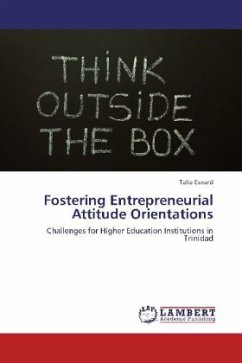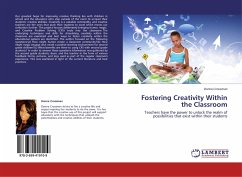
Fostering Entrepreneurial Attitude Orientations
Challenges for Higher Education Institutions in Trinidad
Versandkostenfrei!
Versandfertig in 6-10 Tagen
52,99 €
inkl. MwSt.

PAYBACK Punkte
26 °P sammeln!
Social cognitive theory presents a dynamic theory, which engages in a scientific study of how people s thoughts, feelings, and behaviours are influenced by the actual, imagined, and implied presence of others (Allport 1985, 3). The hallmark of such an approach is its claim that social interaction informs cognitive processes (as the axis around which social behaviour is learnt), within a reciprocal process, which can be studied scientifically. Thus, central to social cognitive theory is Bandura s (1986, 18) concept of reciprocal determinism, that is, the understanding of human function in terms...
Social cognitive theory presents a dynamic theory, which engages in a scientific study of how people s thoughts, feelings, and behaviours are influenced by the actual, imagined, and implied presence of others (Allport 1985, 3). The hallmark of such an approach is its claim that social interaction informs cognitive processes (as the axis around which social behaviour is learnt), within a reciprocal process, which can be studied scientifically. Thus, central to social cognitive theory is Bandura s (1986, 18) concept of reciprocal determinism, that is, the understanding of human function in terms of a complex dynamic triadic reciprocal function in which behaviour, personal factors and environmental events all operate as interacting determinant of each other . Relatedly, based on the above approach, the social cognitive theory examines the impact of the collective or the structural on the individual or the agent, particularly on the formation of particular attitudes. As such, the social cognitive theory potentially offers the study important insights into the dynamic process in environmental and/or structural factors shape students Entrepreneurial Attitude Orientations.












